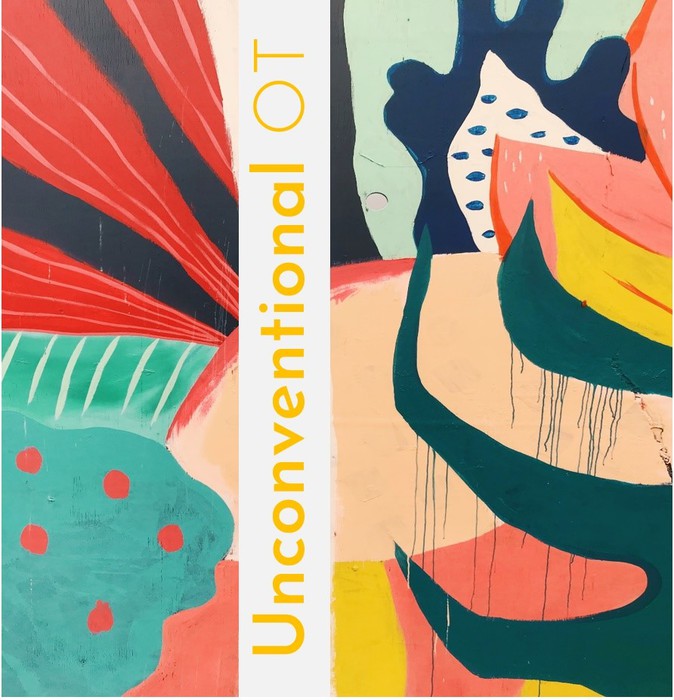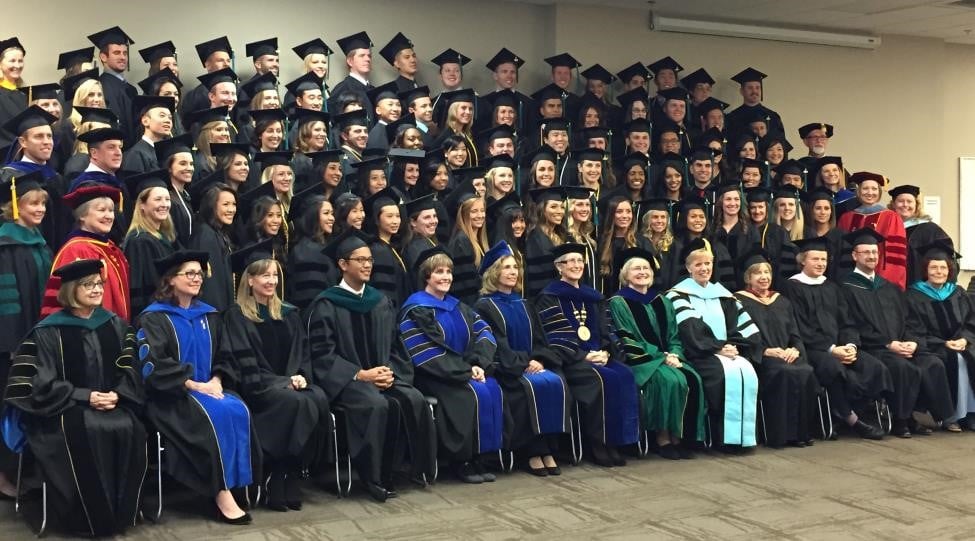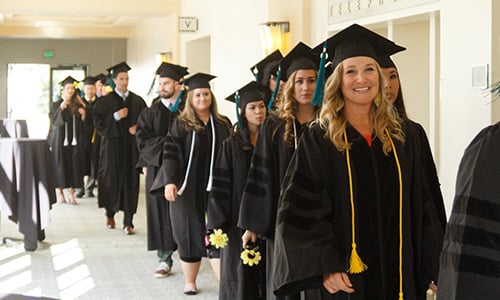
For her capstone project in USAHS’s Doctor of Occupational Therapy (OTD) program, Jessica Morgan (now “Dr. Morgan”) had planned to volunteer at a transitional housing facility in Denver, where she would explore the role of occupational therapy in helping the homeless population. But like many of her classmates, she had to re-envision her project when COVID-19 created shutdowns across the country and she could not enter the facility.


Dr. Morgan’s interest goes beyond working with people who are homeless—she’s passionate about working with refugees, the LGBTQ+ community, individuals within the correctional system, and other marginalized populations. So when she needed to recalibrate her capstone project, she widened its lens to encompass these and other nontraditional areas of OT. “Occupational therapists and occupational therapy students lack awareness, understanding, and resources regarding non-traditional practice areas,” she writes. Dr. Morgan created a project that provides a wealth of free resources for OTs and OT students about how they can serve these populations, thus generating discussions and inspiring action.
“I want to be a person who asks questions that no others or few others are asking,” Dr. Morgan says. “I aspire to bridge gaps within OT as a profession and, most importantly, gaps within care for populations in need. OTs are equipped with a valuable skillset to facilitate positive change and reduce disparities.”
Website: The Unconventional OT
Dr. Morgan created a website called “The Unconventional OT.” The site focuses on several nontraditional areas of OT: working with individuals who are homeless, the LGBTQ+ community, refugees and asylum seekers, and forensic populations. It also features sections on sexual activity and intimacy and on the use of drumming to increase social participation in children with special needs.
Each topic includes in-depth research about the issue, followed by information about how OTs in different roles (e.g., educator, leader, policy developer, researcher, and direct service provider) can address patient needs from their different perspectives. Dr. Morgan offers ideas for assessing and treating patients in each population and explores the opportunities and challenges for OTs.
The site also touches on issues related to OT entrepreneurship and advocacy because “nontraditional areas go hand-in-hand with these roles,” Dr. Morgan says. “People may have to volunteer in that area and then create their own position or program.”
“I wanted to identify practice areas and begin connecting the dots for other OTs,” Dr. Morgan says. “By taking some of the burden of research off, I can give people a head start and hopefully provide indirect encouragement to pursue these practice areas. There is research out there, but it can be outdated and difficult to wade through.” She worked hard to synthesize it, and the results are impressive. Dr. Morgan collaborated with other students to create the drumming, LGBTQ, and forensic sections and wrote the rest herself. “By working together, OTs can collectively create positive change,” she says. “Progress within non-traditional practice areas requires enthusiasm and momentum over an extended period of time, which is difficult, if not impossible, to do single-handedly.”
The Role of OT in Working with Marginalized Populations
Dr. Morgan began by writing about her original topic, working with individuals who are homeless, which she knew about from previous volunteer experience. “There is a little bit of progress in this practice area for OTs,” she says, “but they can’t quite get universally established. It’s a population in dire need. There are many solutions thrown at it but little progress has been made.” Homelessness has been rising over the past few years, and is growing now because of the economic crisis caused by the pandemic. “It’s a multifaceted problem, and OT is so holistic—we’re primed to address the issues. Very few practitioners can look at it with as many lenses as we do.” She notes that physical health, mental health, work, social life, sleep, and sexual life are all areas of OT.
Dr. Morgan also has a special interest in refugees and asylum seekers. “People are in cages at the border, separated from their families,” she says. “This has a significant occupational impact, which results in negative physical and mental health consequences. I wanted to explore the OT’s potential role in these facilities, and I feel it’s a timely issue to address.”
She was drawn to writing about LGBTQ+ issues because members of this community often face discrimination in healthcare settings. “OTs can work with people who have gender and sexual orientation differences, ensuring quality patient care,” she says. As for forensic populations, Dr. Morgan says that within prisons, jails, and youth facilities there is typically little to no focus on rehabilitation, which is sorely needed. This creates a distinct opportunity for OT.
Dr. Morgan wanted to include the topic of sexual activity and intimacy because “sexual expression and participation are significant components of the life experience, and issues in this area can lead to poor mental and physical health,” she says, noting the recent shift in society toward more open discussion about sexuality, substance abuse, and LGBTQ+ issues.
A Podcast and Facebook Group
To explore the drumming and social participation topic, Dr. Morgan partnered with classmate Kate Kowalyshen (now “Dr. Kowalyshen”), whose capstone project was about the use of drumming to increase social participation in children with disabilities. Drs. Morgan and Kowalyshen continued their collaboration by co-hosting the Unconventional OT podcast. They produced an episode about drumming in which they interviewed an OT who works in this mode. They also broadcast an interview about nontraditional practice areas with Dr. Kayla Collins, EdD, MOT, OTR/L, then an assistant professor of occupational therapy and the OTD coordinator on the St. Augustine campus. Other shows featured interviews with faculty and practitioners about eating disorders and acute behavioral health.
Dr. Morgan also started a Facebook group for unconventional OTs to connect with each other, network, and share resources; the group has over 170 members. She says that people from Canada, Australia, and the UK have reached out to her. Thanks to socialized medicine, OT is better established in nontraditional areas in these countries. For-profit medical care and poor funding for mental health care pose significant barriers to U.S.-based OTs interested in non-traditional practice areas, Dr. Morgan notes.
The Unconventional OT features over 400 citations and many links to websites, videos, and other resources. “I took on a little too much,” Dr. Morgan laughs. “But it’s because I’m passionate.” She hopes to add other topics over time.
Support from a Key Advisor
Dr. Morgan says that Dr. Kayla Collins, her doctoral coordinator, helped facilitate some contacts and was a main source of support and encouragement for her. “Dr. Collins went above and beyond to help me throughout the entire capstone process,” she says. “She supported me in taking on any challenges—as big a challenge as I wanted to.”
“Jessica’s project was so ambitious and creative,” Dr. Collins says. “Her love for OT and passion for inclusion is evident in her work. Her project started out in a totally different direction, but given the challenges of interacting directly with clients during the pandemic, she had to find new avenues to pursue her goals. The outcome of her project was more impactful and important for furthering the profession than what either of us could have imagined at the onset. She worked so hard, and I know she will continue to advocate for OT and the unique needs of all populations.”
Occupational Justice
The ultimate goal of Dr. Morgan’s project is to reduce occupational injustice through advocacy. “We all deserve to have a meaningful life and to have occupational justice,” she says. Occupational justice is defined as “the right of every individual to be able to meet basic needs and to have equal opportunities and life chances to reach toward her or his potential but specific to the individual’s engagement in diverse and meaningful occupation.”[1]
One of the project’s key takeaways for Dr. Morgan was how much these nontraditional topics overlap, with clients experiencing similar needs—and OTs facing similar barriers to providing services.
“Working in these areas is challenging—but it is also very possible,” Dr. Morgan says. “When I write about it and talk to the people who are really doing it—who have prepared themselves for these challenges and are less intimidated by them—working as a nontraditional OT seems more attainable.”
Now, Dr. Morgan is studying for the board exam and hoping to find a role in a general setting, such as inpatient rehab. Eventually, she wants to do community-based and mental health–focused work, but she aspires to be a strong generalist before specializing. She has a lot of ideas. And, knowing the kind of ambition and follow-through she has, she will very likely realize them.
The University of St. Augustine for Health Sciences (USAHS) offers hands-on Master of Occupational Therapy (MOT) and Doctor of Occupational Therapy (OTD) degrees. Practice with mock patients in our state-of-the-art simulation centers and learn anatomy with our high-tech tools. Prepare for clinical practice with patients across the lifespan, as well as advanced roles in research, practice leadership, and policymaking. Residential and Flex (online/weekend) paths are available. We also offer an online Post-Professional Doctor of Occupational Therapy (ppOTD) program designed for working clinicians and healthcare educators, with optional on-campus immersions and an annual interprofessional trip abroad.
[1] A.A. Wilcock and E.A. Townsend, “Occupational Justice,” in E.B. Crepeau et al., Willard & Spackman’s Occupational Therapy (11th ed.). Baltimore: Lippincott Williams & Wilkins, 2009.








